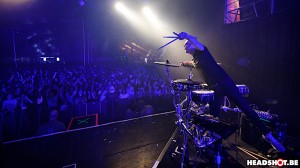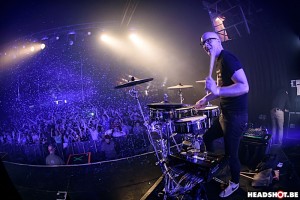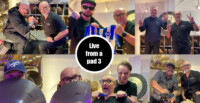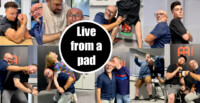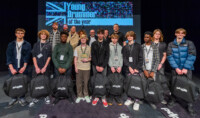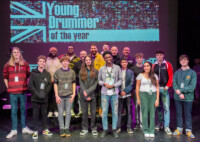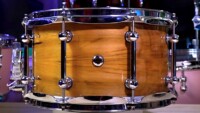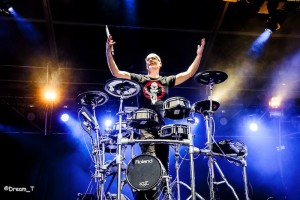 With his big, exuberant movements and fast, hard hitting drumming style, Michael Schack is the perfect proof that electronic drum pads can’t melt.
With his big, exuberant movements and fast, hard hitting drumming style, Michael Schack is the perfect proof that electronic drum pads can’t melt.
Being a demonstrator and developer for Roland and having been one of the first to bring edrums to the live stage, Schack is widely known for his work behind the rubber tubs – but it’s only one side of his working.
This, and his proficiency as an acoustic drummer, producer and programmer has been proven many times working with artists like Ozark Henry, Kate Ryan, Soulsister, Milk Inc, SquarElectric, Netsky and many more.
As a clinician and affiliate instructor for the world renown online drumeo.com, Michael shares his knowledge and experiences at events and drum shows all around the globe and has gathered a huge following.
I caught up with Michael at the UK Drum Show to talk about his passion for electronic drums, his work with Belgian artist Netsky and his current solo project as a standup performing #DjDrummer.
You were voted E-drummer of the Year 2013, 2014 and 2016. How come the love for E-drums?
I started playing a full electronic drum kit at the end of 1992. That was the release of the Roland TD-7. I was just a drummer in Belgium and had just started my professional career. I knew some people at Roland Benelux because they were also very active musicians. On a sunny fall morning I got a phone call of the Marketing and Artist Relations manager who asked me if I would like to check out this new electronic drum set they were about to release. In the same call he asked me if I could speak French and when I said yes he told me the gig as a demonstrator for the TD-7 would be vacant if I wanted it. They were a bit fed up with having to have multiple guys for the different language areas in the Benelux countries and wanted somebody who could cover it all.
I was all over the TD-7 immediately. As a young drummer I had always a little Dr.Boss pedal with some synth drum sounds close to me, so for me it was a natural step. Although I just mainly played acoustic drums, I also liked electronics and had just bought a sampler – this was a great opportunity.
So when I grew as a drummer I also grew with what Roland brought to the market but I was mainly an acoustic drummer – and I still am.
On stage of course I’m really well known as an electronic drummer because I went deeper into it and got so active with it on the live stages. I already played hybrid drums in 1994 – as did Lars Ulrich when he started with Metallica decades ago. Together with many metal drummers he has been triggering his kick drum for years now but today everyone goes like: “Oh, this is new.”
I really got into live playing with electronic drums on the bigger live stages when I started being the drummer with a dance/techno band from Belgium called ‘Milk Inc.’ and a Pop singer called ‘Kate Ryan’. That’s when I started using only e-drums on stage and that’s when all things V-Drums in my career really got a public push.
Are you sometimes a bit annoyed that people see you as the e-drummer?
No, not at all. And I love being the underdog. Still, when I’m at a drum festival – in the US for instance where the drumming community is maybe a little more conservative sometimes – they say: “Hey man, you should play some real drums!”. But I actually am! V-Drums are “real” drums for me, like electric guitars are…guitars, right? Even some really famous drummers went: “What are you doing? You’re like a Tupperware drummer playing those electronic pads..”. I always invite them playing my gigs with an acoustic drum kit. It’s like playing an acoustic guitar on a Metallica song. And I still love being the underdog and the ranting on what I do because it means there is also still a lot of positive potential out there.
Do you have a different approach when playing electronic or acoustic drums?
No, not at all. I can hit both as hard or as soft as I want so physically for me there is no different approach. I’m using the same pedals, the same hi hat stand, the same sticks, the same body, the same shoes… The big psychological difference between playing acoustic and electric – which is also one of the reasons people feel really awkward when they start playing electronic drums – is that the sound source is not where you’re hitting. You’re used to interact with the shells directly but with edrums the sound is coming from a module through headphones or speakers. That’s actually a very big difference. Once you get into doing some studio work and you know a little bit about mixing and microphone techniques, you kind of understand more easily that physically there is not a big difference as long as you play a good electronic drum set.
How important do you find it for young drummer to learn on both e- and a- drum kits? It seems that lots of beginners who learn exclusively on electronic drums struggle to get a good sound out of an acoustic kit.
Yes but on the other hand I know some examples of young people that started out playing electronic drums and they all after a while end up being better drummers on acoustics than I was. First of all because they can practise without bothering anyone which means they’ve already put in many more hours of practise and second they are able to play along to tracks they can actually hear, and therefore lock in right and tight on top of those.
True, some people who started out on electronic drums actually sound rubbish on an acoustic kit but that’s mostly due to physical differences. For instance, on acoustic drums the instruments are bigger so of course their hit is not as precise. When you started off on acoustic drums your hit will always be right in middle of an electronic pad as well. So it all depends on the drummer, his personality, his physical abilities and being open minded.
Today for instance young people are used to seeing a sample pad on stage or having some electronic pads incorporated into a small funk setup – and that’s really good. It means that young people are more open-minded towards different kinds of music, also due to online music portals like Spotify. I mean, they’re not just metal fans anymore but can also be drum’n’bass fans at the same time. If I were young now I would probably be a much better drummer because of all those online drumming footage which is available for free on YouTube.
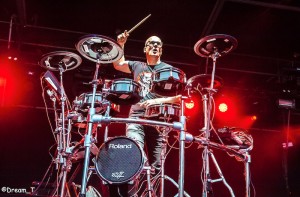 Talking about the YouTube situation: do you think young drummers are a bit overloaded by it all?
Talking about the YouTube situation: do you think young drummers are a bit overloaded by it all?
Sure. There is too much information available at the same time. That’s also why you see pop artists coming up within one year but disappearing even faster. When older pro’s or when I started off playing there was more consistency. You dug into a drummer’s drummer – for example: “Hey, now I’m a fan of Simon Phillips” – and you really wanted to know as much as possible about his sound and about the technique he’s using. You would watch the full DVD from start to end. Now you only see 2 or 3 minutes on YouTube. After 2:30 your attention span is already going down. That’s also why DVDs don’t work anymore. It’s more difficult to stick with something and keep your eye off those suggestions appearing on the left of the screen, so you have to be more strict with yourself to actually chose a path online and stick with it for a longer time. That’s the only way you’ll get the full value out of it instead of just scratching surfaces.
You play with quite big movements. That links in with your philosophy ‘Own your live performance’.
This is a thing I learned from a very young age. I was kind of small when I was young – when I was 11 I was the third smallest guy in the classroom at school. I always had my cymbals high and far away because I was a fan of Stewart Copeland and Billy Cobham. When I grew a little older and taller it just stuck with me. You know, when you start learning to play drums there is this movement thing that comes into your body and it will stay with you for the rest of your life. It’s like the way you walk or the way you sit on a bicycle.
Also, I just always played quite loud. I’m not sure why but I’ve always been a fan of a loud kick with full impact and a cracking snare rim shot and it’s something I never got rid off.
At the age of 13 till 16 I also did some dancing, a little bit of a ballet kind of thing. My mother pushed me to do this because she saw my back posture being out of alignment. Those dancing exercises just triggered my kind of “big moves” playing style. I like moves in general and when I play drums I’m internally dancing. I will never actually dance with anyone for real but when I sit behind the drums I feel like dancing. That’s probably where it comes from.
‘Owning your live performance’ is all about the things you can do to make yourself a little bit more apparent on stage. At the same time when you see somebody who is playing very enthusiastically, it will sound better and motivate the other musicians to really lock in with you.
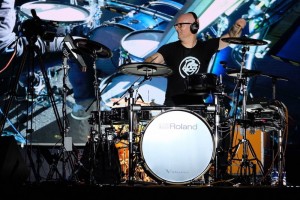 You’re the drummer for Netsky Live. Live drum’n’bass sounds like quite something.
You’re the drummer for Netsky Live. Live drum’n’bass sounds like quite something.
Well live DnB drumming has been around for a much longer time than Netsky Live but it was never exclusively done on an electronic drum set. It was always done on an acoustic drum set with triggers or with acoustic drums only being played on top of a backing track.
In 2011, I was already doing the drum’n’bass stuff on clips for Roland, and Boris (Netsky) sent me a message on Facebook saying he saw one of my clips and wanted to hook up. At that exact same moment I was actually sending him a message on his Facebook profile saying: “Hey man, I really like your new single, it would be great to meet and hook up one day!”. We exchanged phone numbers and only one hour later we found out that we only lived 10 minutes apart. He immediately came to my studio where we started talking and the next day I joined him with an Octapad for the last 15 minutes of his DJ set at a festival in Belgium. The synergy that happened right there on that stage triggered the whole idea. Just over 6 months later, in which we were experimenting with MIDI routings, keyboards, side-chaining live from the drum set…. Netsky Live actually debuted the first full live show at a sold out Hospitality DnB night at Brixton Academy in London and it all worked out and evolved from there.
Let’s talk about your solo project.
Yes, I’ve never been this serious about a solo career until now. It started last year and was called ‘Smash Up’ but I’m now changing this to ‘Michael Schack – #DjDrummer’. Not ‘Dj and Drummer’ or ‘Drummer and Dj’ but ‘DjDrummer’ in one word – and as one person. I used to have a duo project called ‘SquarElectric’ which was me in the front and a video artist (who also did the audio mixing) behind me. It looked as if he was Dj-ing but I was actually already triggering all the music mashup mixes myself at that time. Now I’m taking it a step further being all by myself on stage, no video anymore and I’m performing and playing all drum beats live standing up. It’s really picking up. No more double bass drum pedals, as I’m really standing straight up on my left leg for 1 hour while hitting the hell out of the electronic set.
I also don’t use any click tracks during my drum festival gigs or solo #djdrummer sets. Everything I’m doing is completely live and triggered “on the spot”, with me playing on top of the “no drums” mixes I create. That’s something I’m really lucky to be able to do, playing without a click. It’s something that just happened when I started integrating samplers and loops into my drumming performances : no click, trying to lock in with the basses and loops.
I really think this could become my big thing for the next few years. Netsky Live is currently ‘on hold’ because Boris Daenen (aka. Netsky) moved to L.A. for a couple of months working on new music, so I’m really investing in the #djdrummer performances.
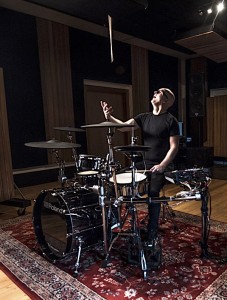 It’s quite a different approach playing standing up, isn’t it?
It’s quite a different approach playing standing up, isn’t it?
I used to do it already while playing for a Belgian artists called Ozark Henry. With him, the usual festival gigs were played on regular acoustic drums but for a 2007 theatre tour I was playing a Yamaha Steve Jordan Cocktail Set standup drum set. These days I play the Tama Cocktail Jam set and I’m really training myself playing standing up on acoustics as well. In this challenge, you drumming body really needs to help you. One osteopath for instance told me and even warned me not to do it, but now after 30 to 40 standup #djdrummer shows I’m still in good shape, my hip is still ok and when I want I can do two gigs a day like this. I will feel a little bit more sore in the morning after compared to a full day of regular “sit down” drumming, but it’s all fine. I did swap from my running workout to cycling though because I think both running and playing drums standing up would be too much strain on the hip and my left knee.
You’re quite an Ableton ambassador.
Yes, I used to be a Sonar and Logic guy for many years till 2011 but at some point I just decided f*** it, I’m tired of waiting for edits being calculated, consolidating audio files etc. And also, end of 2009 I was desperately in need of a software that I could use both in the studio while producing and on the live stages while performing with SquarElectric. I also never truly believed or worried about the discussion on ‘one sounds better than the other’, it didn’t really bother me. For me, it’s just about being as productive and “crash free” as possible – and Ableton keeps me productive. Another thing is that anything I prepare in the studio, even multitrack recordings, I can immediately take it on stage without transferring it to another software project or whatever. Ableton lets me do that. But generally today, most of the music production software packages out there are good though in what they’re specifically designed for. If you’re a Logic fan and you have that workflow in your fingers, good! Stick with it! But if you’re a drummer I really think you should get yourself into Ableton because let’s be honest, if you’re now auditioning for a pop act there will be two main questions: One, do you own a trigger pad?; Two, can you work with Ableton? Three, Can you actually start a click track, trigger loops or start backing tracks without the keyboard player or the monitoring engineer having to take care of this?
That would have been my next question: Do you think it’s a necessity nowadays?
Nothing is an “all or nothing” necessity but it’s true musician market value when being able to work as a drummer with software and Ableton in particular. It will also make your drumming more interesting because you understand what’s going on there and you can reproduce some of the album work the artist wants you to incorporate, and being able to perform it live with your drums while locking in and controlling those loops, well that’s 2017! It’s also a great way and in my opinion a must to learn about music technology if you want to be a pro for the next decades. There are so many drummers out there who still seem to be not interested in this but I assure you they will be or already are missing out, whatever genre they play. And certainly when they want to hook up with a hip hop, EDM, DnB for any current pop music performing artist.
Also, you’re always increasing your market value when bands which are hiring drummers want to save money on ‘personnel cost’. If they have to hire an Ableton operator on top of a drummer, that doubles the cost. Even if you’re not as spectacular as the other auditioning drummer who’s up for the job, if you can take care of Ableton or things digital much better than that other one it’s probable you’ll get the job in the end.
Think of it like this: In the beginning secretaries all had mechanical typewriters. Then most of them who were serious about increased productivity got into electronic typewriters. Then came the desktop computer with Microsoft Word and anyone who got into that from the beginning could grow in their job. Then came the internet and the whole IT industry and Ableton came with it already more than 15 years ago… [laughs]. You have to follow the evolution and make it your friend rather than stay distant or see software and digital drums as “the enemy”.
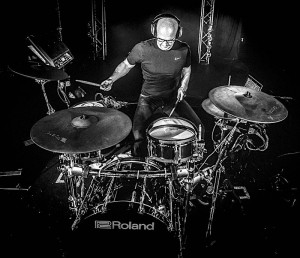 You’re a Drumeo affiliated teacher. Do you teach a lot in your studio in Belgium too?
You’re a Drumeo affiliated teacher. Do you teach a lot in your studio in Belgium too?
I used to give private drum lessons in Belgium but I actually stopped in 2005 because I was too busy touring. I was playing a lot with different bands, started playing the big stages and doing the Roland stuff internationally which really picked up then. As I was travelling so much, I felt I should invest the time at home into my own playing. Teaching wears you out. You don’t sit down to practise after teaching all day, you just wanna go home and rest your ears.Then Drumeo came and there I was in April 2013 as a guest in their studio while I was touring Canada with Netsky. The fact that I speak French opened up the possibility of me doing some lessons for them and they asked if I had a video set up. I didn’t but it was something I wanted to get into. So thanks to them I learned a lot about online video streaming and now I cannot imagine myself not being able to livestream at least one Drumeo lesson a month. It really pushes me to actually find interesting lesson topics and make them accessible – but also translate them into good looking and inspiring online video lessons. It’s a different way of teaching also because you actually have to show something to people without being able to stand next to them and show them hands on.
Drumeo is amazing. They invest a lot of money in continuous improvement of production and lesson content, and it shows as they have so many more subscribers each month – it’s still growing!
Finally, what’s next?
I’m really focusing on the DjDrummer thing but I’m also playing drum festivals still.
I’m also in the middle of producing some new content for upcoming Roland products which will be released in 2018. We’re a small team of drummers that are actually asked by Japan to not only just give input but actually program sounds, kits and so on. And I’m currently beta testing some new software things and producing more content for my joint venture plug in with the guys from Strezov Sampling.
It looks like 2018 is gonna be another exciting year so let’s try to stay healthy and increase the BPM capabilities…:)
Thanks a lot for your time Michael!
Interview by Tobias Miorin
January 2018

